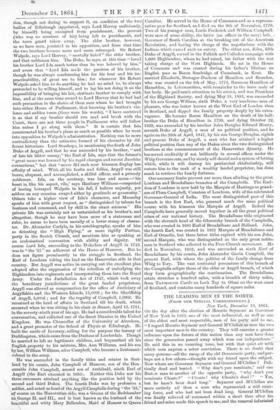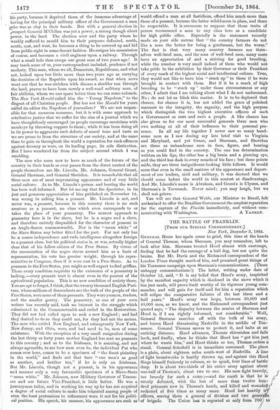THE LEADING MEN IN THE NORTH.
(FROM OUR SPECIAL CORRESPONDENT.)
New York, December 10, 1864. ON the day after the election of Horatio Seymour as Governor of New York in 1862, one of the most influential, as well as one of the ablest and most respectable, men of his party said to me, "I regard Horatio Seymour and General M'Clellan as now the two most important men in the country. They will exercise a greater influence upon the future of this nation than any men have done since the generation passed away which won our independence." He said this in no vaunting tone, but with that quiet air *RV which men express a sober conviction. There is no doubt that many persons—all the rump of the old Democratic party, and per- haps not a few others—thought with my friend upon the subject. Now where are Governor Seymour and General M'Clellan ? Poli- tically dead and buried. "Why don't you nominate," said one Boston man to another of the opposite party, "why don't you nominate Choate?" " Choate ! why Choate's dead !" "Yes, but he hasn't been dead long." Seymour and M'Clellan are more entirely nil than a man who represented a still exist- ing force, and who had not been dead long. General M'Clellan was finally relieved of' command within a short time after his friend and mine made this speech to me, and the removal infuriated
his party, because it deprived them of the immense advantage of having for the principal military officer of the Government a man 'rho was as clay in their hands. But with a general election in prospect General M'Clellan was yet a power, a strong though silent power, in the land. The election over and the party whom he weakly suffered to mould him to their purposes defeated, north, south, east, and west, he becomes a thing to be covered up and hid from public sight in some decent fashion. He resigns his commission of course, and becomes a civil engineer upon a railway. Through what a small hole thus creeps our great man of two years ago ! It may teach some of us, your correspondent included, prudence if not modesty. This man, whom we all, Democrats, Republicans, and what not, looked upon but little more than two years ago as carrying the destinies of the Republic upon his sword, so that when news went out that he was stricken with disease a shudder ran through the land, proves to have been merely a well-read military man, of fair abilities, whom we can spare better than we can some colonels. The New York Herald called him the "Young Napoleon," to the disgust of all Christian people. But has not the Herald for years called its editor the Napoleon of journalists? We are not respon- sible for that nauseous nonsense, but it is with some approach to retributive justice that we suffer for the sins of a journal which we have thoughtlessly encouraged (as people encourage musicians with monkeys by throwing coppers to them), while it has been doing all in its power to aggravate such defects of moral tone and taste as we are prone to from the structure of our society, and at the same time to gain us throughout the world a reputation for such offences against decency as were, on its leading page, its sole distinction. But I have wandered far from the subject around which I was rambling.
The men who seem now to have as much of the future of the country in their hands as ever passes from the direct control of the people themselves are Mr. Lincoln, Mr. Johnson, General Grant, General Sherman, and General Sheridan. It is remarkable that all these men are of most unpromising appearance and of very little social culture. As to Mr. Lincoln's person and bearing the world has been well informed. But let me say that the Spectator, in its just and generous appreciation of him published on November 19, was wrong in calling him a peasant. Mr. Lincoln is not, and never was, a peasant, because in this country there is no such creature as a peasant, no class which even corresponds to or takes the place of your peasantry. The nearest approach to peasantry here is in the slave, but he is a negro and a slave, and therefore entirely disqualified for the character of peasant in an Anglo-Saxon commonwealth. Nor is the "mean white" of the Slave States any better fitted for the part. For not only has he a coarse independence and rude intelligence altogether foreign to a peasant clam, but his political status is, or was, actually higher than that of his fellow-citizen of the Free States. By virtue of the enumeration of the negro slaves around him as a basis of representation, his vote has greater weight, through his repre- sentative in Congress, than if it were cast in a Free State. As to peasants in the Free States, you might as well expect to find griffins. There every condition requisite to the existence of a peasantry is lacking,—every peasant trait is absent even in the poorest of the agricultural population. This is no new condition of society there. You are apt to forget,! think, that the twenty thousand English Puri- tans, whose millions of descendants are the bulk of the people of the Free States, were none of them peasants. They were yeomen, traders, and the smaller gentry. The peasantry, as one of your own writers has recently said, took no interest in the struggle which culminated in the Commonwealth and ended in the Restoration. They did not feel called upon to seek a new England ; and had they desired to do so they could not, for they had not the means. The men who settled New England, and subsequently New York, New Jersey, and Ohio, were, and had need to be, men of some substance. With the exception of a very small emigration during the last thirty or forty years mother England has sent no peasants to this country ; and as to the Irishman, it is amazing, and not always agreeable, to see how soon even he, the individual Pat who comes over here, ceases to be a specimen of "the finest pisinthry in the world," and finds out that here "one man's as good as another, and betther too," if he is only an Irishman. But Mr. Lincoln, though not a peasant, is in his appearance and manner only a very favourable specimen of a Slave-State " meau white." Mr. Johnson, now Military Governor of Tennes- see and our future Vice-President, is little better. He was a journeyman tailor, and in working his way up he has not acquired a degree of social culture to make him tolerated among people of even the least pretensions to refinement were it not for his politi- cal position. His speech, his manner, his appearance are such as would offend a man at all fastidious, offend him much more than those of a peasant, because the latter wriuld seem in place, and there be respectable. It is erroneous to suppose that these traits of person recommend a man to any class here as a candidate for high public office. Especially is the statement recently made on your side untrue that "the country farmers do not like a man the better for being a gentleman, but the worse." The fact is that very many country farmers are them- selves well-bred men, and the sons of well-bred men, many more have an appreciation of and a striving for good breeding, while the number is very small indeed of them who would not take pride in the exhibition by their Governor or their President of every mark of the highest social and intellectual culture. True, they would not like to have him "stuck up" to them if he were brought in contact with them. But if it be a mark, of high breeding to be "stuck up" under those circumstances or any other, I admit that I am talking about what I do not understand. No; do not let us blink this matter. It is to be deplored that chance, for chance it is, has not added the grace of polished manners to the integrity, the sagacity, and the high purpose which distinguish the two highest executive officers of such a Government as ours and such a people. A like chance has also given us for our most successful generals three men who owe nothing at all of their influence to their personal pre- sence. In all my life together I never saw so many hand- some men as I saw during my late brief visit to Virginia and Maryland, and yet Grant, and Sherman, and Sheridan are three as unhandsome men in face, figure, and bearing as you could find in the country. The one has determination written on his lips, the other has a big brain and a piercing eye, and the third has dash in every muscle of his face ; but these points aside, they are three insignificant-looking little fellows. It would seem that even in the small matters of the appearance and deport- ment of our leaders, civil and military, it was decreed that we should come before the world in this contest at disadvantage. And Mr. Lincoln's name is Abraham, and Grant's is Ulysses, and Sherman's is Tecumseh. Never mind ; you may laugh, but we shall not grieve. -
You will see that General Webb, nur Minister to Brazil, felt authorized to offer the Brazilian Government the amplest reparation for the capture of the Florida immediately, and without com-































 Previous page
Previous page